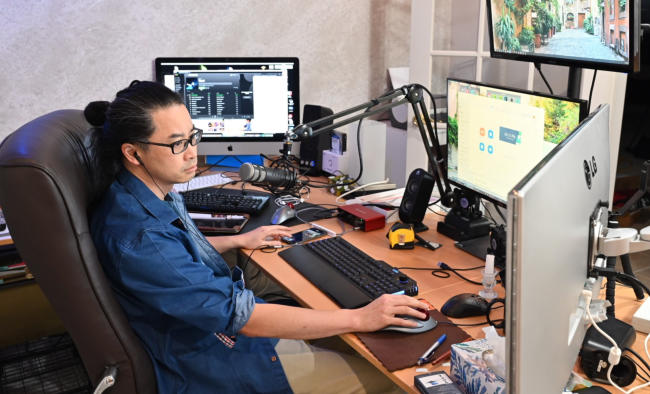

© Greg A. Chung-Yan, 2025

COMMUNICATING WITH A PROFESSOR
Students and professors differ in how they prefer to communicate with other people. One of my grad students–during her practicum–conducted a survey and found that if there was an emergency on campus, most students would prefer to receive an alert by text; most professors would prefer an alert by e-mail. There is no “better” way to communicate, but they are all different and people vary in their ability to use different means of communication. Don’t assume that a professor (or employer) is accustomed to the same ways in which you would e-mail, text, or phone a contemporary. A professor once told me the use of :) was an “old joke.”Telephone/Voice-mail
I rarely answer the phone any more. I usually let it go to voice-mail. I’m not unusual. If you leave a voice-mail message for a professor, speak clearly and deliberately, repeat your telephone number and full name at least twice, and briefly indicate the nature of your issue. Follow-up with an e-mail.Texting and social media
Few standards exist governing the professional use of social media (and other post- 2004 communications technology). Different departments have different norms, so this is something you have to find out for yourself. But when in doubt, stick with a professor’s e-mail, office phone, and visits during office hours. Other forms of communication might be considered too personal or inappropriate.
Guidelines for crafting an e-
mail to your professor
The preferred form of address to a professor is [title, last name]. When in doubt, address them as “Doctor” or “Professor.” (I’m partial to “Sir”, having gone to an all-boys Catholic high-school) Never use their first name unless you are invited to do so. Sign your e-mail at the end of the message using your full name. Including your student number doesn’t hurt. Write a topic-relevant subject line. Include the course number if you’re in the professor’s class. Proofread your e-mail for errors. Avoid abbreviations, slang, colloquialisms, and cultural references after the 1990s. Keep it brief. If you have more than two questions, or your issue is complex, see the professor in person. If possible, send the e-mail via computer rather than your mobile phone. Avoid embarrassing autocorrects. Sarcasm, irony, and jokes are easily misinterpreted over e-mail. Although emoticons help to clarify meaning and tone, they also make you seem unserious and childish. Separate different topics by paragraphs or bullet-points. Including “ASAP” in your e-mail usually results in the opposite happening. If you are introducing yourself to a professor, do not attach your CV, resumé, or any other document to the e-mail. It could be flagged as SPAM. And it’s presumptuous to expect them to read it.












Greg A. Chung-Yan, PhD
Industrial-Organizational
Psychology
University of Windsor
Applied Social Psychology
MA / PhD Program
uwindsor.socialpsychology.ca
Pandemic Teaching, 2021

© Greg A. Chung-Yan, 2025
COMMUNICATING WITH A
PROFESSOR
Students and professors differ in how they prefer to communicate with other people. One of my grad students–during her practicum–conducted a survey and found that if there was an emergency on campus, most students would prefer to receive an alert by text; most professors would prefer an alert by e-mail. There is no “better” way to communicate, but they are all different and people vary in their ability to use different means of communication. Don’t assume that a professor (or employer) is accustomed to the same ways in which you would e-mail, text, or phone a contemporary. A professor once told me the use of :) was an “old joke.”Telephone/Voice-mail
I rarely answer the phone any more. I usually let it go to voice-mail. I’m not unusual. If you leave a voice-mail message for a professor, speak clearly and deliberately, repeat your telephone number and full name at least twice, and briefly indicate the nature of your issue. Follow-up with an e-mail.Texting and social media
Few standards exist governing the professional use of social media (and other post-2004 communications technology). Different departments have different norms, so this is something you have to find out for yourself. But when in doubt, stick with a professor’s e-mail, office phone, and visits during office hours. Other forms of communication might be considered too personal or inappropriate.Guidelines for crafting an e-
mail to your professor
The preferred form of address to a professor is [title, last name]. When in doubt, address them as “Doctor” or “Professor.” (I’m partial to “Sir”, having gone to an all-boys Catholic high-school) Never use their first name unless you are invited to do so. Sign your e-mail at the end of the message using your full name. Including your student number doesn’t hurt. Write a topic-relevant subject line. Include the course number if you’re in the professor’s class. Proofread your e-mail for errors. Avoid abbreviations, slang, colloquialisms, and cultural references after the 1990s. Keep it brief. If you have more than two questions, or your issue is complex, see the professor in person. If possible, send the e-mail via computer rather than your mobile phone. Avoid embarrassing autocorrects. Sarcasm, irony, and jokes are easily misinterpreted over e-mail. Although emoticons help to clarify meaning and tone, they also make you seem unserious and childish. Separate different topics by paragraphs or bullet-points. Including “ASAP” in your e-mail usually results in the opposite happening. If you are introducing yourself to a professor, do not attach your CV, resumé, or any other document to the e-mail. It could be flagged as SPAM. And it’s presumptuous to expect them to read it.























